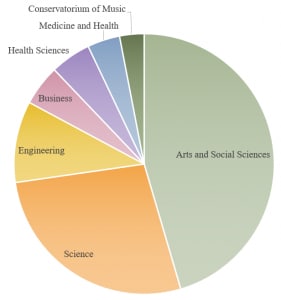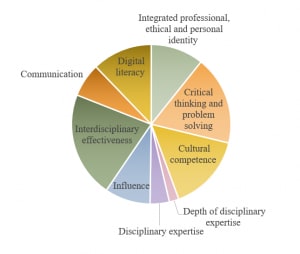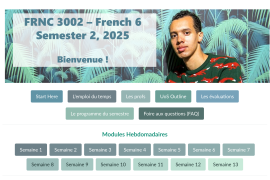It’s now over 18 months since the Open Learning Environment (OLE) was officially opened as a key and innovative feature of the reimagined Sydney educational experience. The OLE was conceived to encourage and allow students to broaden their learning and explore individual interests outside their main discipline and build novel skill combinations for their studies and careers. Alongside for-credit units taken by students in liberal studies (and some other degrees), the OLE contains fully online and free zero-credit point units available throughout the year for all students and staff.
This article was contributed by Ruth Weeks and Adam Bridgeman.
Make-up of the OLE
The OLE opened in 2018 with 60 pairs of 0 and 2 or 6 credit point units and 8 standalone 0 credit point units. An additional 35 pairs were added in 2019 alongside a further 3 standalone units. Another 36 pairs and 2 standalone units are now being constructed for launch in 2020. The latter includes 11 pairs of 0 + 2 credit point units designed for higher degree by research (HDR) students. The chart opposite shows how the different faculties and University schools contribute units to the OLE.
Overall, the OLE appears to be fulfilling its objective of offering students broader and multidisciplinary experiences but may not yet be set up to play a full role in building and providing study opportunities across the full range of graduate qualities.
| Theme | Number of units | ||
| 0 credit points only | 0 + 2 credit points | 0 + 6 credit points | |
| Basic skills in programming | 0 | 8 | 0 |
| Data analysis & numerical skills | 1 | 11 | 0 |
| Developing research skills | 6 | 3 | 0 |
| Economics, entrepreneurial & design thinking | 0 | 9 | 0 |
| Ethics, ethical reasoning, contemporary debates & critical thinking | 0 | 21 | 0 |
| Foundational & advanced communication skills | 2 | 11 | 2 |
| Health challenges & medical science | 2 | 19 | 0 |
| Personal, interpersonal & intercultural skills | 1 | 18 | 9 |
| STEM literacy | 0 | 6 | 0 |
| Teamwork, team leadership and project management | 1 | 1 | 0 |
| Ethics (HDR) | 0 | 2 | 0 |
| Qualitative analysis (HDR) | 0 | 2 | 0 |
| Quantitative analysis (HDR) | 0 | 7 | 0 |
| Total | 13 | 118 | 11 |
Enrolments
Alongside the usual semesters, many of the 2 credit point units run in intensive, month long sessions. The yellow bars in the figure show the number of units available by session type. Enrolments in individual units vary considerably as shown below for 2019. These are shown by the blue bars in the figures. When selecting sessions, coordinators appear to be sticking to the traditional semesters. Of the intensive sessions, April appears to be the most popular with both coordinators and students whilst quite a few units are available in July with low enrolments. On average, students are taking just over 6 credit points each year with most taking their full 12 credit point load over the first 2 years of their degrees.
Students on the whole are taking advantage of the interdisciplinary nature of the OLE and are choosing units from outside their main areas of study. The most popular units in terms of enrolments were those from the Faculty of Arts and Social Sciences, although this partly reflects the large number of units offered by this faculty.
Improving OLE units
The Board of Interdisciplinary Studies Subcommittee for the OLE reviewed the performance of 2018 units and a further review will be carried out at the end of 2019. Alongside use of the unit of study survey (USS) data, a dedicated survey for students is about to be released to further understand how to further improve the current units and where the OLE needs to grow.
The Educational Innovation team can provide support to colleagues who would like to further improve their OLE units. For example, we can run sessions on writing MCQs, improving feedback, and using group work. Information and resources to assist you in designing your site, including quizzes and assessments can be found in the OLE Resources Site.
The approaches needed to design and teach an OLE unit can be quite different to those needed for other units of study. All OLE units are blended, with elements of self-directed learning, and some are completely online. The Modular Professional Learning Framework (MPLF) offers a flexible way to build staff members’ capacity for quality learning and teaching. A number of the modules would be beneficial for staff teaching or supporting OLE units and for those interested in online learning, including:
- Module 04: Curriculum design and constructive alignment
- Module 05: Assessment and feedback for learning
- Module 13: Designing for blended and online learning
- Module 14: Online tools for interactive and collaborative learning
- Module 15: Creating and using educational media
Signing up for MPLF modules is easy via the Canvas site.









